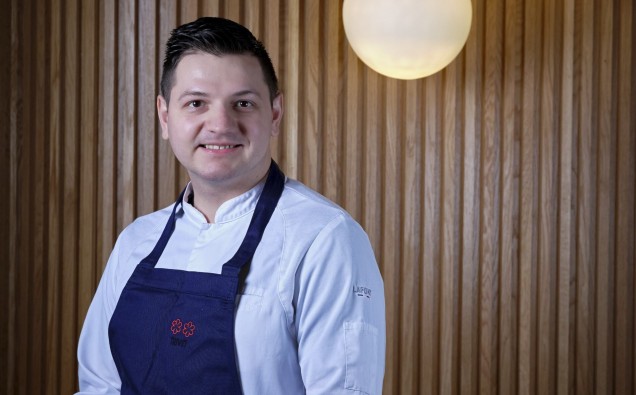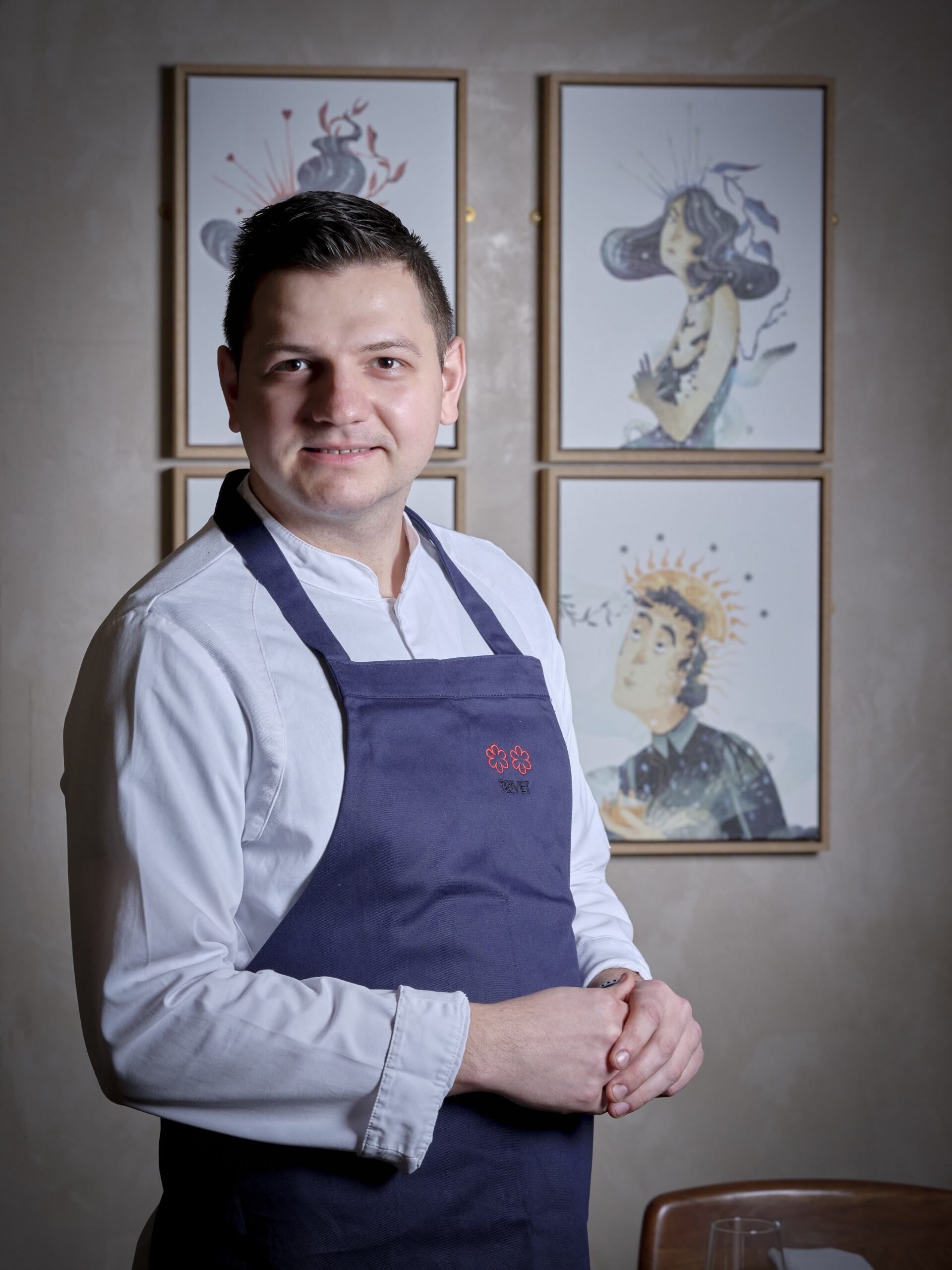Chef Lukas Juhaniak (Instagram A/c: chef.lukasj), hails from Považská Bystrica in Slovakia. He attended the School of Commerce and Services in Púchov to study hotel management. In 2016, after working as a seasonal intern on the Greek island of Rhodes, he relocated to London to work at Chef Pierre Gagnaire’s Sketch restaurant. He traveled to the village of Les Baux-de-Provence in France in 2018 to work at the Baumanière hotel, which is a member of the Relais & Châteaux. After the epidemic, he worked as a sous chef at Trivet after spending almost two years at the Michelin-starred Leroy restaurant in London. Chef Lukas was a vital member of the team that helped the restaurant receive its first Michelin star in 2022 and its second in 2024. In his role as Head Chef at Trivet since February 2024, he has collaborated with the founders, executive chef Jonny Lake, and master sommelier Isa Bal to push boundaries and lead his staff to new heights.
Q.) Over the course of your profession, you travelled extensively. Did it have an impact on your cooking?
Chef Lukas: Absolutely. Traveling is essential to our line of work, and without it, I wouldn’t be where I am now. I enjoy traveling, usually by myself, and cuisine is always the main focus. I instantly reserve five or six restaurants whenever I visit in order to experience new concepts and viewpoints. However, copying isn’t the point—that’s boring. Sometimes the inspiration comes from the surroundings, a novel flavor combination, or even a new method on a dish. Then, suddenly, an idea is born. We develop and transform it into something unique when I bring it back to the restaurant.
Q.) What made you decide to pursue a career in cooking?
Chef Lukas: I was raised playing sports, whether it was football or ice hockey, and I dare say I was really excellent at both, just like practically everyone else in Slovakia. I started to get interested in cooking when I was about fifteen years old. This change was mostly influenced by Chef Zdeněk Pohlreich, a well-known TV personality whose programs I liked to watch. When I was first starting out in the culinary industry, he had a big impact on me.
Q.) Describe your culinary styles to us.
Chef Lukas: I consider myself fortunate to be able to accurately describe my cooking preferences and style at the age of 29. My culinary skills are based on my training in a traditional French kitchen. But the Mediterranean has always appealed to me, so naturally, the Riviera is central to my style. My inspiration and my passion for cooking come from places like the south of France, Italy, Greece, Turkey, and North Africa. Recently, both at home and at restaurants, I’ve been leaning toward cooking less meat and more fish and vegetables. My goal is to provide food that is colorful, fresh, and lively.
Q.) You have received training from numerous cooks across various nations. How did it benefit your career?
Chef Lukas: Extensively. Without mentors, we wouldn’t exist, thus it’s crucial to locate one as soon as possible, just as in any other career. Throughout my career, I’ve had the honor of working directly or indirectly with a number of outstanding chefs. Chef Pierre Gagnaire and his unique style have greatly influenced my path. In a similar vein, my style was greatly influenced by the chefs I collaborated with at Sketch, namely Chef Hervé Deville and Denis Bukin. Naturally, it has been an incredible experience to work with Chef Jonny Lake and Isa Bal to transform Trivet from a relatively new restaurant to one with two Michelin stars. It’s been incredible to watch our connection grow into a genuinely unique partnership, and I sincerely appreciate both of them. In my professional life, I owe them a lot.
Q.) Why it is more difficult to find traditional Slovak sweets at Slovakian food stores.
Chef Lukas: It’s an excellent question. We used to have a lot of distinctive specialties, but I don’t go home very much these days. The traditional customs, in my opinion, are gradually disappearing since no one is left to continue them. Additionally, international products have a big influence on food stores back home, just like they do everywhere else, and maybe the younger generation prefers them to native treats.
Q.) What challenges do you encounter in the kitchen?
Chef Lukas: No day in the kitchen is ever entirely as planned; there are always obstacles to overcome. It’s a difficult job. It’s a challenging job. I would like to think that modern kitchens are easier to work in, but we still have to deal with human nature and adhere to rigid deadlines since food needs to be prepared for lunch or dinner. Naturally, this creates pressure.
What makes us unique is how we respond to these everyday obstacles. If we get enamored with cooking in general, we will succeed. Naturally, nobody enjoys their work every day—no one can—but we are drawn to the concept of our sector, and that enthusiasm is what keeps us going every day.
Q.) What was the most difficult dish you have ever prepared?
Chef Lukas: It had to be France. We were required to make Lièvre à la Royale (hare à la royale), a classic that is a mainstay of French cuisine, in my third week of study. It was really difficult, and I had never done anything like it before. After the chef demonstrated it for me once, it was my turn. I had no idea what I was doing. It was astounding to see the entire animal, still in its skin, before it was turned into that famous meal. Cleaning the animal, deboning, creating the farce, and wrapping, marinating, cooking, and— above all— making the blood sauce were all steps in the procedure. Without a doubt, it was the most intricate dish I have ever prepared. It takes four to five days to complete the entire process. I’ve never cooked it again, but it was a memorable experience that I recall vividly to this day.
Q.) What guidance would you offer someone aspiring to work as a chef?
Chef Lukas: It’s a really good question, and I believe that everyone would have a different response. I would advise you to spend some time learning about the aspects of cooking that you find most enjoyable. We’re fortunate to have a wide range of opportunities in this industry. It’s quite acceptable that not everyone enjoys working with three-Michelin-starred cuisine. If that’s not your thing, you can work in catering, fast food, a restaurant, and a lot of other places.
I would advise you to identify your true passion, be honest with yourself about it, and look for a mentor or two. Take in as much information as you can from them; watch, imitate, and modify what suits you. At the same time, embrace a small amount of healthy ego and don’t be scared to be who you are. If you remain loyal to your passion, you will succeed.
By: Rida Khan (Aviation Author)
Instagram A/c: aviationauthor.ridakhan



















